Summer — the
only we shall have upon this London Mission of ours — has come and flown like
the swaths of rain, sunlight, and clouds forever blowing over this Isle.
But nay. “Forever blowing over”? I guess that’s not entirely true. A stretch of six to eight weeks this summer
was London’s driest and hottest ever recorded.
Little to none of that passing cloud and rain. The season began its typical lush green:
But over the
drought the parks and lawns got burnt to a yellowed crisp. Hyde Park, for example, went from emerald
green, to this:
Throughout damp
and dry, Doll and I were busy with much YSA activity. We were in charge of a major event held the
first weekend in June called “Pitch Your Tents Toward the Temple.” (Not Pitch Your Tents Into the Temple,
as one of our Romanian brothers kept calling it.) The event was something like a Youth
Conference. We had nearly 100 YSAs in
tents and sleeping bags at a campground near the London Temple. Doll oversaw an evening barbecue and other
meals. The YSAs performed baptisms and
endowment sessions. Our Stake President
and his wife taught a seminar. There
were games and other events. Twas a
great experience. And this Pitch Your
Tents is a main reason we have extended our mission from March until June 2019
— so that we can run it again next year.
(It would be hard for our replacements to arrive brand new and try to
ramp things up on short notice.)
We had other Temple trips with our YSAs. Here I stand with some of our beloved Chinese converts — on a visit for baptisms for the dead:
One Saturday, we
did a YSA outing to Brighton Beach. (In the first picture with Doll and me are Bishop Dave and Judy Kirkham).
We joined Monday
Family Home Evenings at the Church or — weather permitting — in Hyde Park:
About once a month we got together with senior couples for FHE.
Doll put on her
big dinners every Thursday Night (80-100 attendees). Followed by Institute. Where I taught a small Missionary Prep group
— whilst our Stake Presidency and the full-time Institute Director, Brother
Mark White, instructed two larger classes.
On Tuesdays we
continued to host Institute at our Flat (Doll providing our YSAs another meal).
One of our
random duties as senior missionaries has been to inspect — for safety and
cleanliness — the Flats occupied by the young sisters and elders. Once every transfer period (six weeks), we must
visit a batch of 7-10. Not necessarily
the task we would most want to perform every day of our mission. But on that occasional basis, tis actually
quite fun. Roaming greater London and
the countryside, seeing the sights, and visiting with our dear young
missionaries.
Our last two
inspection tours have taken us to the lovely Southend-on-Sea — where the River
Thames meets the English Channel.
Doll is so sweet
to the missionaries. She can’t possibly
inspect their places, without offering a reward from her grab bag of giant
chocolate bars:
In gaps between
formal activities, we carry out what we call our “personal ministry” — with us
visiting others, or others visiting us when they yearn for Doll’s great food
or other homey comfort.
Much as ever, London has seemed the great
epicenter for the scattering and gathering of Saints abroad. President and Sister Oaks we here for a week. And indeed resided in the very building
sharing a wall with our Flat at Queens Gate 124.
Here are the Oaks — with daughter-in-law and bodyguard — out for a walk
in our neighborhood. And at the Church
with Alexander, our somewhat autistic buddy from Poland.
On another occasion, Elder Uchtdorf and a host of leaders visited and spoke to us. Here the Uchtdorfs greet our missionaries outside Royal Albert Hall — and then get a kick out of shaking Doll’s “Pope hand” at Church.
The First of
July 2018 was a historic day for our Mission.
The London South Mission — for years our great nemesis — was dissolved,
and most of it merged with our England London Mission. The day of this victory we also crowned a new
Mission President — David Checketts of Utah and New York sports fame.
I’ll confess I
was a tiny bit skeptical about this new President.
I know of
instances (three in particular) where I really wondered whether the Church got
it right. They called Mission Presidents
who appeared — from my uninspired perspective — to have attained worldly
achievements. But not, perhaps, the same
spiritual qualities I had seen in great Mission Presidents like Glen Roylance (of my German
mission days) and Mark Stevens (our first president here in London). I hoped President Checketts had been called
primarily for reasons other than his worldly success and notoriety.
I needn’t have
worried.
President and
Sister Deb Checketts are wonderful.
We’ve worked with them long enough to see that they are truly full of
the Spirit. And love, diligence and
charity. Serving with them is a
joy. As is learning from their examples.
The growth among
our Chinese brothers and sisters continues to amaze and be a great joy to
us. One example is sister in the middle
of this photo — Yuan Lou, known to us by her Anglo name Eva. She is one of the small, but increasing
number, who are joining the Church in mainland China. It was there that she came into contact with
members of a branch in her hometown of Chengdu, and learned the Gospel from
them and online. Eva remained faithful
and active in China for eight years.
Then she came to London for her Master’s Degree this summer. Once here, became close friends with Carol
(on Eva’s left), and brought her to Church.
Carol is now a great active member.
And they have been fellowshipping their friend Abbi (on their left).
More common is
the opposite pattern involving our buddy Kaiyan. He joined the
Church in London, and was one of the brothers we most loved here. Then Kaiyan returned to his home in Nanjing,
China. Where he is now involved with the local
branch. He recently sent us these
pictures — of a baptismal service at his branch in Nanjing.
Here are some
snapshots — the faces of our eternal brothers and sisters we are coming to love so
dearly on this mission:
Any homesickness
we might feel on this mission has been softened by the many visits from friends
and family from home. In late Spring my beautiful
Sister Amy and her equally beautiful husband Al Shaw came for about a week.
Here we see
those darlings at the production of Wicked:
Much to our joy,
great friends from my youth, Dan and Jeannette Memmott, made good on their
threats to come stay with us.
My handsome
nephew Andre Junk was with us off and on over a stretch of some weeks, as he
and friends from work conducted business and traveled about Europe. It was while with us here inLondon that
Andre took the dramatic step of cutting the locks he had grown for years:
I continued my
almost daily bicycle explorations of London.
In doing so, I
come across all manner of interesting stuff.
Here, for example, is “the Tower.”
The house now long owned and inhabited by Led Zeppelin’s Jimmy Page. (When Jimmy saw me outside, he eagerly
invited me in. And was grateful beyond
words when I taught him a few riffs.)
The London film
industry is forever shooting movies in the parks near our flat. I didn’t recognize the movie they were making
here, as I rode through Battersea. But
I’m pretty sure the actor in the middle of the first picture is Ed Stoppard —
known for The Crown, Frankenstein Chronicles, and The Pianist.
I often come
across blue historical markers indicating homes where famous people lived and
worked:
In riding about I frequently meet the Queen’s horse guards:
The Pall Mall (Buckingham Palace) is part of my regular cycling route.
Not everything I come across is happy. One day this summer, a terrorist in a car mowed down several cyclists in front of Westminster Palace, and along the very path I often ride. (Tis fortunate — I suppose — that in this one the victims were only hospitalized. No one died.) Here I come upon the scene, with the roads blocked, and media swarming to report the event:
Still. We got out whenever possible to enjoy the
offerings of this great city. Here we
stroll the canals near Regents Park and Camden Market.
A cultural highlight of our lives, we visited the Globe Theatre. And watched from the standing stalls — literally and arms length from the stage — a production of Othello, with Mark Rylance (one of my all-time favorite actors) as Iago.
And in
incredible sports experience. One of our
Senior Missionaries, Brad Hertz, showed me the tricks at Wimbledon. We arrived at 3:00 in the morning, and
managed to get courtside seats (not far from Serena’s mom). Where we watched Serena win her Quarterfinal
match. And saw Angelique Kerber (who
eventually beat Serena in the Final) win hers:
We also caught
seniors matches with the likes of Goran Ivanisevic and Tracy Austin.
The Fourth of
July was really special. The Queen sent
us these sweet sentiments:
Later, in
August, when she was off to Balmoral Castle in Scotland, we were allowed to
wander her Buckingham Palace.
Our boy James
brought his bride Jessee and our granddaughter Annie all the way from
Okinawa. And we had them for a full
three weeks! Whilst they were here, we
saw much of London.
We made road
trips to Canterbury and Dover.
And to Oxford,
and the Cotswolds.
Part of our
going to Oxford included a special Tolkien Exhibit at the Bodleian
Library. Among items featured were the
originals of those simple drawings that have enchanted me since my early
boyhood.
On FamilySearch.org,
I learned that one set of my great-great-grandparents — the mother and father of my
great-grandmother Charlotte Pead (Byron Harvey) Allred -- both joined the Church and
emigrated to Utah from just outside of London.
Whilst traveling
with James and Jessee, we visited Dancers End, home to Grandfather William
Pead:
I wonder if Grandfather William could ever have imagined that his great-great grandson would one day be back in his village. Eating blackberries growing here. Admiring pheasants in the fields. Etc.
Or that his
3d-great grandson James would be here, wrestling his obstreperous 4th-great
granddaughter Annie.
And here —
Whipsnade. The home of Susannah Johnson
Pead:
They are peaceful lovely places today. I imagine they were even more so then.
There was the
great tug of the heartstrings, as James and Jessee returned to Okinawa. Especially sad was little Annie, who had
formed a close and loving bond with here Grandma Darlene:
And our last
sight of them. Jessee wedged in the
door, as their train tries to leave without them:
The Summer heat
was made pleasanter by Doll’s green thumb. She turned our balcony — which faces onto busy Queens Gate — into a
secluded little garden spot.
There was,
however, a sad moment on her garden balcony.
Doll began reading the Book of Mormon to her plants, in hopes it would
help them flourish. It seemed to work
well at first. But then she got
distressed and reported her plants were dying.
Doll swears these troubles came when she started reading them the parts in Mormon and Moroni
where the Nephites fall into ever greater depravity, and are finally destroyed.
(I’m not kidding. Doll truly
thought she had ruined her plants — as she ruins so much else -- by reading to them the depressing verses.)
Senility is rapidly
getting the best of us. It’s growing
ever harder to achieve our goal — of cobbling together one working brain
between the two of us. Fortunately, we
have name tags. We’ve taken to wearing
them at all times, even around the house.
That helps us remember who we are:
And how about
this sweet little Sister Allred.
For those with the time and inclination to read more about Susannah Johnson
Pead and William Pead. Here are some items posted on Family Search:
Susannah
Johnson, daughter of Benjamin Johnson and Charlotte Budd, the eighth child and
fifth daughter, was born at Whipsnade, Bedfordshire, England on 4 November
1848. She was a studious girl but was unable to attend school due to the
untimely death of her father when she was but four years old, and subsequently
the poverty of her mother.
SUSANNAH
JOHNSON
Her
grandfather, Reverent William Johnson, a Baptist Minister, was educating his
only son, Benjamin for the Baptist Ministry.
One day Benjamin heard the LDS. Elders and was attracted to the Church. After a long drawn out argument with his
father, Benjamin joined the Latter Day Saint Church, much against his fathers
wishes. His father disinherited him,
leaving his all to the Baptist Church.
Reverent William Johnson was a splendid man, he was self supporting, and
he never allowed the “Contribution Plate” to be
passed in his church, which he built himself.
Susannah was
a very dutiful, devoted daughter to her mother, and while her older sisters,
Sarah, Rebecca, Fanny and Charlotte worked outside the home, Susie worked in
the home and cared for her mother’s baby and her little sister Mary Ann
(Polly). Dunstable, a village near where
the Johnson’s lived was famous for it’s straw hat industry, and Susannah,
Polly, and Joseph augmented and helped with the family savings and earnings by
learning to braid the straw (Plaiting is the industrial name for such a
process) at home while they were yet small children and too young for work
outside of the home. After Susannah was
married and living at Garden City in Bear Lake, she made straw hats in many
different weaves, for her neighbors who wanted them, and many others who lived
farther away from her.
Susannah
attended Bible Classes for awhile, but most of her education consisted of what
her mother had taught her. Her mother
could write her name beautifully on ice skates.
This is remarkable in that although the Johnson children were all good
readers, Susie and Polly the two youngest, who had received practically no
formal education, were reputedly exceptionally intellectual. During their entire lives they all retained a
love for the classics, never showing any interest in “best sellers” magazine
fiction or any of the more popular types of literature. The older Johnson children received good
educations while their father lived.
When
Susannah’s brother, William died in England, Susannah and her brother Joseph
who were both small children, walked many miles through the Chalk Pits after
dark to tell the Elders to come and arrange for the funeral. (The Chalk Pits is a place where many murders
took place and robbers lived there. It
was supposed that ghosts also lived there, and this was enough to scare any
little child.)
Benjamin,
Susie’s father had died after a long illness, using up their money, and leaving
the family of eight in very poor circumstances.
Often they would wait for the baker cart, and often when it came they
could buy only one or two small loaves of bread, one slice being their
meal. They longed to go to Zion to be
with the saints there.
In
appearance Susannah was tall and dark and was often referred to by her father
as the “May Pole”. A friend of the
family tells us that all of the Johnson girls were unusually attractive, but
that Sarah and Susannah were the two most beautiful in appearance, and that
Susannah was the best housekeeper of all the girls. This was due to the fact, probably, that she
had kept house while the other girls worked outside the home (a case that
practice makes perfect).
Susie
emigrated to America with her mother and sisters Frances, Mary Ann (Polly), and
brothers Ben and Joseph in 1868 on the first iron clad steamer that ever
sailed, “Minnesota”. They left
from Liverpool, England with 534 other LDS immigrants. John Parry was the Church leader on the
ship. They arrived in New York 12 July
1868. Several families left England
with the Johnsons, among them were the Webbs, Peads ( Elizabeth, Mary, Sarah,
Levi and Parley), Annie Dyer, and the Austins.
Susie later married a son of the Pead family, William Pead. He had come to America previously in 1866.
The railroad
only extended as far as Laramie, Wyoming at that time (1868). Susie was then nearly twenty years old and
walked most of the way from Laramie to Salt Lake City, Utah a distance of five
hundred miles, so that her mother who was in poor health could ride.
Joseph and
Ben worked for the railroad laying track between Laramie in Wyoming and Ogden,
Utah in order to pay for the family’s passage to America. At the same time their sisters Susannah and
Frances worked in the railroad camps cooking for the men, to help pay the
immigration.
During the
short time they were so employed, Susie met a young man, Mr. M. Who had come
from the East to help build the railroad.
They fell in love, but Mr. M. Did not belong to Susie’s church, so she
hesitated to accept his proposal.
He gave her
a very beautiful ring, and when he left camp he promised to write to her once
every week. Susie received no letters
from him, and upon her return to Salt Lake City, Utah, a Mr. Richards, a member
of the church who boarded with the Johnson family, wanted to marry her. (He also wanted to marry her sister
Frances). Susie refused to marry Mr.
Richards, but he came to see her every day and he wrote her poetry. He even went so far as to follow her through
the Endowment House to see if she wouldn’t change her mind about marrying
him. She was courted by William Pead and
on 4 May 1869 was married to William Pead in the Endowment House in Salt Lake
City, Utah.
Susannah’s
wedding supper was a gala affair held at Mrs. Johnson’s home. Susie looked very beautiful in her wedding
dress of lavender velvet with pearl trimming.
The family and friends were present, and according to one guest, now a
woman past 90 years old, it was an unforgettable night. A very dramatic incident occurred during the
course of the dinner. “A knock was heard
at the door and in walked Mr. M. He had
not known of Susie’s betrothal to William Pead, and had come to marry her and
take her back East with him.
He had
written to her every week as he had promised to do. (Mr. Richards later admitted to having destroyed the letters, declaring he
felt it was his duty to do so, so Susie wouldn’t marry a non-Mormon). Mr. M. Was stunned with disappointment, but
congratulated William, telling him he was very lucky in having won the most
beautiful woman he had ever known; then turning to Susannah he told her he
would always love her, but that she would never see or hear from him
again. She didn’t apparently. She gave her ring to her sister Polly who was
then 19 years old, Polly gave the ring to Frances (Fannie) Susie’s daughter,
and Fannie is now an old woman and still had the ring.
Susanna and
William had an obsession for orderliness and cleanliness and both were very
good managers, so their home was immaculate within and surrounded by beautiful
flowers and a vegetable garden without.
Susie’s
younger sister, Polly was a notoriously casual housekeeper who doted on the
social side of life. It may be said that
Susie unintentionally had contributed to Poly’s dislike for housework because
when the two of them were living at home, Susie always insisted on Polly
entertaining the guests while Susannah cooked the dinner and did the
dishes. Polly many times expressed the
hope that there would be no dishes to wash in heaven.
All of the
Johnsons sang well and William Pead had a splendid voice. He and Susie sang a great deal together. Susie also wrote excellent poetry. Unfortunately none of this poetry has been
preserved except a song which Susannah sent to her sister, Frances while she
and William were living in Southern Utah helping to build up the Dixie
area. Frances’ daughter Frances
Schwenson, still has the song written in Susannah’s own handwriting.
William and
Susie were requested by the church to go to Southern Utah and help build up the
Dixie area surrounding St. George, Utah.
They were released after a few years, but suffered great hardships while
there. The Peads later settled in
Northern Utah in the Bear Lake region.
Susie’s
mother was with her when the Pead’s first child, William Jr. was born in 1869,
the exact place or date is not known. We assume that the Peads returned from
St. George to Bear Lake in the 1869's.
William Jr. only lived one week and is buried in Salt Lake City, Utah.
Susie did a
lot of crocheting, often making her own patterns. She knit stockings for her family and was a
very ambitious hard working woman. After
moving to Star Valley her eyesight began to bother her. They took her to eye specialists in both Salt
Lake City and Ogden in Utah. Both the results
were not good. The specialists said her
optic nerve in her eyes were paralyzed.
In less than a year she was totally blind.
She passed
away June 21, 1913 and was buried June 23, 1913 in the Fairview Cemetery. Her casket was home made and covered with
white outing flannel. The flowers were
hand made out of paper.
WILLIAM PEAD
Written by
his daughter Frances Elizabeth Pead Brown in 1971.
My father, William Pead, was born in
Dancers End, Buckinghamshire, England on March 6, 1846. He was the oldest of a family of five
children. His father, James Pead, was
born August 10, 1824 and died on Christmas Day in about the year 1853. He died of small pox which at the time was a
most dreaded and fatal disease. He was
29 years old.
Father, William, worked at anything he
could to help his widowed mother, Elizabeth Wilkenson. She was born May 7, 1828 in Buckland,
Buckinghamshire, England. She died March
14, 1907 in Lehi, Utah. She and Grandpa
joined the Church in England upon hearing the gospel. He was soon made an Elder. One of the L.D.S. missionaries who contacted
them was Heber C. Kimball.
In 1856, when my father was just a young
man, he crossed the ocean in a sailing vessel.
He emigrated to Utah in the early 1860's. He was anxious to come to Zion because he
knew that the gospel was true and he was also very eager to earn some money to
send to his widowed mother so that she and her four children, Mary, Sarah, Levi
and Parley could join him in America.
My father was ever grateful for the
privilege of coming to America, the land of Zion, choice above all other lands,
where the Lord's choicest blessings are bestowed upon those that love and serve
him.
The ocean trip was tiresome and full of
worries. The journey across the plains
was long and very hard. He drove a
6-span of mules for a Brother Stringham.
At this time my father was called Johnny Bull. This was a nickname for English Boys.
One time while crossing the plains he took
ill with a fever and it seemed as though the fever would consume him. He asked time after time for water but was
refused, being told if he drank it, he would die. It was then thought to be dangerous, if not
fatal if one drank water while suffering a fever. One early evening after most had retired, he
aroused a young boy who was near by and said to him, I must have water, I can't endure this. The boy got him a bucket full of water and a
dipper. My father said that he drank off
and on all through the night until all the water was gone. Within a short time he recovered. He said that the bucket of water along with
faith and prayer saved his life.
Working in any church capacity and paying
his tithing were two great loves of father.
He was religious, honest and a good man.
After arriving in Utah he worked hard to earn enough money to emigrate
to Zion his Mother, brothers and sisters.
My mother's family, the Johnsons, immigrated at the same time as my fathers
family, the Peads. There were also
Webbs, Austins, Empeys and others. They
were all in the same company and sailed on the same ship from England in 1868. The ship was named the Minnesota. It was the first iron clad vessel (steamship)
to cross the Atlantic. They began their
journey across the plains by wagon.
Susannah walked most of the way so that her mother, who was not well,
could ride. Her shoes wore out mid-way
on the trip, perhaps near Omaha. She
then used her mothers shoes when necessary.
They might have traveled part of this journey by railroad. They arrived in Laramie, 500 miles from Salt
Lake City. Susannah and her brothers Ben
and Joseph stayed in Laramie and worked to help pay for their immigration. The boys did a form of surveying or grading
the land before the railroad tracks were laid.
They probably helped lay track on the entire 500 mile area. Susannah did cooking and other household
tasks.
Father was called to go to Dixie (St.
George area). His assignment was to fence and plant trees. He learned much about agricultural work and
soil by working in England for a hard-headed or cruel Uncle Daniel
Simmons. Soon after father's father
died, he went to live with this uncle.
His wife was a sister to my father's father James. Uncle Simmons was a very bad tempered man,
but well to do in money matters and he offered to give my father work to help
out with the family income. He was only
eight years old and had much to learn.
Uncle Simmons expected too much of him.
One day as punishment for not doing his work just as uncle desired,
father's dinner was set on the window sill and he was made to stand and look at
it until Simmons and his wife were finished with their dinner and then he was
sent to do other work, still without dinner. On another occasion he was put to weeding a
flower garden just as the young tender shoots were coming up. Not having been acquainted with all the
different kinds of plants, a few flower shoots were pulled up by mistake along
with the weeds. Uncle Simmons became
very angry and sent father to bed in the attic without supper or a light. Williams mother Elizabeth Wilkenson, was a
dear sweet soul who would go to visit him.
He loved her so, and would cling to her hand and walk away with her on
her way home. With tears in his eyes, he
would say good-by, and never once mention the treatment he was receiving from
Uncle Simmons for he knew his mother would have taken him home, but he also
realized how badly his Mother, brothers and sisters needed the small amount of
money he earned.
Late one night as William lay for sometime
in his bed feeling badly for the cruel treatment he had received, he saw a
bright light coming from his door which was shut, and which was just a short
distance from the foot of his bed. The
light came slowly along the wall from the door, along the side wall almost to
his bed. Father became frightened and
pulled the quilts up over his head and lay still for quite sometime, afraid to
look out, not understanding in the least what the light could be. Finally, he moved the covering from his face
and saw the light had gone back to the door.
He said that a voice from the light said, My son, be faithful, be faithful,
and then the light vanished. He said a
peace came to him as he lay thinking of this wonderful experience and he wasn't
afraid after that. He said that it was
his father's voice as clear as he ever heard him speak. Father always spoke the truth and I know this
incident actually happened.
Father was a young man and still single
when he first went to work in Dixie. It
was then a very desolate and sandy place. He lived in a tent and ate corn bread
and bacon and molasses three times a day.
One day as he was ready to eat, a strange man stood in the door
way. Father asked him in to eat some of
the simple fare. They talked of various
things, mainly religion. Finally the
stranger said he would have to be on his way.
Father thanked him for his visit and asked him to come again. He had only been gone for a minute when father
decided to see which way the stranger was traveling. To his surprise the stranger was nowhere to
be seen. He could see his footprints in
the sand for a very short distance then they disappeared. There were no buildings, trees or anything to
obstruct the view or hide the man.
Father felt sure that this was one of the Nephite Prophets. It was always a great pleasure and experience
for him to recall this incident. He
frequently bore testimony to it.
In 1868 father received word that his
mother and brothers and sisters had arrived in Salt Lake from England. He arranged his affairs so that he could go
visit them. It was a glorious
reunion. While in Salt Lake father
became re-acquainted with Susannah Johnson, my mother. They had known each other in England. They were happy to see each other again. In the course of his visit he asked her if
she would be willing to go to Dixie with him to finish his assignment. After due consideration, she consented. On May 4, 1868 they were married in the Endowment
House in Salt Lake City. They lived in
St. George one year or maybe a little more, then went to Salt Lake where mother
gave birth to their first son who was named William James. This baby lived about 12 days or two
weeks. Let me say here that father
always loved Dixie. The climate pleased
him very much and he hoped sometime to return and have a home and land there
but this was never realized. While they
lived in St. George they had beautiful gardens and flowers. I remember my parents telling how the
friendly Indians visited them and loved to eat their watermelons. Sometimes they would get the stomachache
after eating so much. Father learned to
speak the Indian language. He was always
friendly and helpful to the red-man and they were very friendly to him.
William was a good singer, so often he and
Susannah sang in public. He especially
loved to sing hymns; he called them the songs of Zion.
As I have said, they left the South and
moved to Salt Lake. Their next home was
in Randolph, Utah (Rich County). Several
children were born there. A few years
later they moved to Garden City, Utah where father had purchased a place from a
single man who was moving away. There
was a little log cabin on the land. One
day as father was tearing down the building he found a twenty dollar gold piece
on the plank above the door frame. He
said to mother I must try to find the man and send him his money. This man had gone away leaving no
address. In spite of the fact, father
wrote many letters over a period of months before the man was located. The money was promptly sent to him. After father was dead one of the early
bishops said to me, Your fathers word was as good as his bond. Now honesty wasn't the only fine quality my
father possessed. He knew the gospel was
true and lived it. He loved his wife and
family. He lived the golden rule. I, his daughter, honor his memory.
Ogden and North Ogden were the next two
settlements in which the family lived.
In Ogden father worked in a brick yard on 28th Street. Here tow of their children died within a few
months of heart disease and dropsy.
About a year later they moved to North Ogden near the east mountains
where father worked in a lime kiln. He
hauled a load of lime to Ogden each day.
He used a team of horses and a double bed wagon. In this area we had a well kept orchard,
vegetable garden as well as flowers.
In the year of 1895 father moved his
family to Star Valley, Wyoming and in August the same year he homesteaded the
land now belonging to Lloyd Hoopes and Delbert Pead. The land had not been homesteaded before
because most of the land was low hills and the 160 acres was considered almost
worthless. Father donated five acres of
his land for the town cemetery. He had
learned much about agriculture in the old country and upon examining the land
he thought it to be loamy and rock free.
Thirty acres of the land was nothing but sage brush and squirrels. Within a few short years it was blossoming
and producing abundantly.
As in other places, our home in Star
Valley was surrounded by beautiful flowers and a weed free vegetable
garden. Before leaving Bear Lake father
got two large currant bushes. They
traveled with us to the Valley tied to the back of the wagon. Upon arriving he put them up into small
shoots and planted a lovely patch of currants.
These bushes produced so abundantly that we had to have help to pick the
produce. We also had strawberries and raspberries. Father was always so generous and gave away
garden vegetables by the bushel to those who had need of them.
He was a good provider but not a man of
means. One man made the statement that
Father was too honest to get along well in money matters. Father worked so hard and often on moonlit
nights, he would still be found in the fields.
He died at the age of 55.
Father's hair was glossy black and he had such beautiful laughing
eyes. He was such a good father and
husband. We, his children, truly honor
and revere his memory and his strong testimony of the gospel. He was the father or twelve children-eight boys
and four girls. Because of illness,
Father had to go to bed on New Years Day and died some three months later,
March 15, 1901. He was buried in
Fairview cemetery. His casket was
home-made and covered with white outing flannel. All the flowers were hand made form paper.
May we, his
descendants, follow his example of a good life.






















































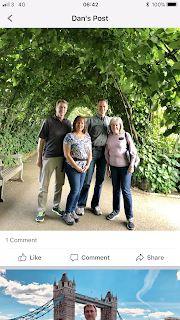











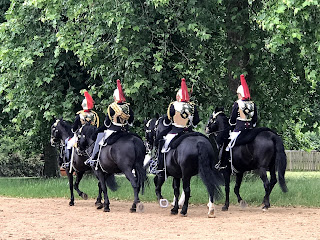
















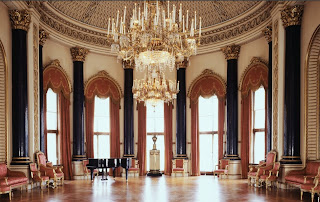













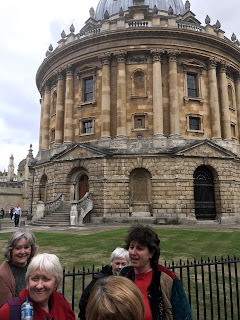
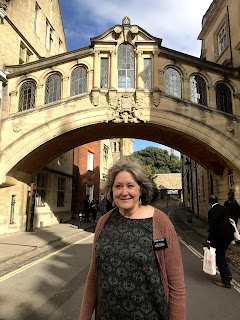
























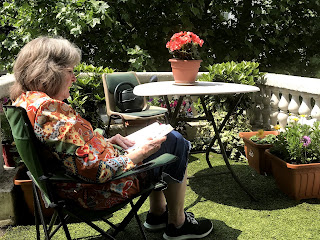

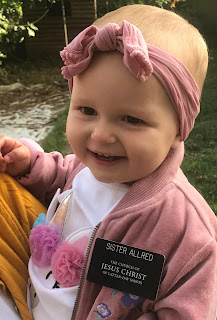
Comments
Post a Comment